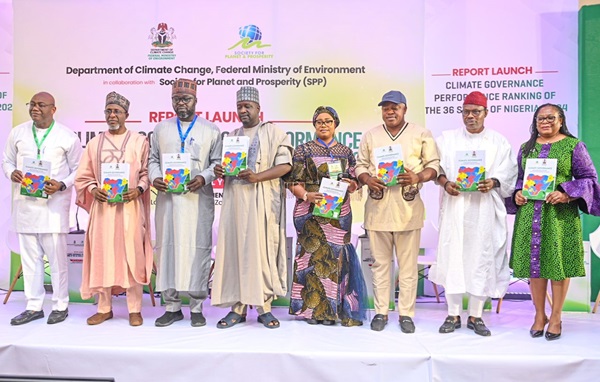…Lagos Wins Best State Climate Governance Award

The Minister of Environment, Balarabe Lawal has reiterated the government’s call for Nigerian states to develop their own climate policies, actions and plans to support sustainable development in the country.
He made this statement during his keynote address at the launch of the Subnational Climate Governance Performance Ranking held in Abuja on Thursday.
Lawal highlighted Nigeria’s vulnerability to climate change impacts, emphasising that addressing these challenges requires a concerted effort from all levels of government. “Climate governance at the sub-national level is essential for several reasons. It is at this level that the impacts of climate change are acutely felt. Coastal communities suffer from erosion, while desertification is rampant in the Northern region. Sub-national governments are often at the forefront of implementing policies and actions that directly affect the lives and livelihoods of people at the grassroots level. Therefore, their role in driving climate action is indispensable,” he said.
The minister explained that the Sub-National Climate Governance Performance Ranking is more than just a ranking—it is a tool for motivation, collaboration, and accountability. The ranking highlights best practices, identifies areas for improvement, and fosters a spirit of healthy competition among states and local governments in Nigeria. By celebrating the achievements of top performers and providing support to those lagging behind, the country can collectively enhance its national climate response.
In her goodwill message, the founder of the Women Environmental Programme, Dr. Priscilla Achakpa remarked that the report not only highlights the performance of sub-national governments on climate change issues but also serves as a catalyst for enhanced climate governance at the sub-national level. She noted that the report comes at a time when there is an urgent need for climate leadership at all levels of governance in Nigeria. The devastating effects of climate change are increasing, undermining development, pushing more people into poverty, and widening gender inequalities.
“It is our firm belief that this report will inspire sub-national governments to take more actions to build the resilience of vulnerable communities and populations against the impacts of climate change and contribute to Nigeria’s efforts in implementing its Nationally Determined Contributions (NDCs) under the Paris Agreement,” she said. She further called on all states, government agencies, international organisations, civil society organisations and other relevant stakeholders to use this report as a guiding light for climate actions in Nigeria.
The 2024 edition of the awards saw Lagos State ranked top among the 36 states in Nigeria for Climate Governance Performance. This maiden edition also ranked Gombe State second and Ebonyi State third, while Borno and Ekiti states jointly took fourth place. Oyo, Kano and Zamfara states occupied the 34th, 35th, and 36th spots, respectively, in the results announced at the event organised by the department of climate change in the Federal Ministry of Environment in conjunction with the Society for Planet and Prosperity (SPP).
Earlier in his remarks, the director of the Society for Planet and Prosperity, Prof. Chukwumerije Okereke, explained that the criteria for this ranking are rigorous and comprehensive, reflecting the multifaceted nature of climate governance.
“The process encompasses policy formulation, implementation effectiveness, stakeholder engagement, resource allocation, and measurable outcomes. This holistic approach ensures that the assessment is not merely quantitative but also qualitative, capturing the distinction of effective climate governance across states in Nigeria,” he added.

